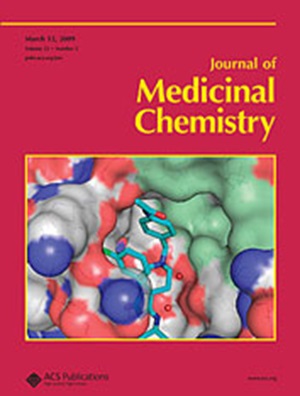具有脑外显性的高选择性PARP1抑制剂的设计、合成和药效学评价
IF 6.8
1区 医学
Q1 CHEMISTRY, MEDICINAL
引用次数: 0
摘要
选择性聚(adp -核糖)聚合酶1 (PARP1)抑制剂不仅具有抗肿瘤功效,而且还具有减轻广泛PARP抑制通常相关的毒性的潜力。在本研究中,我们设计并合成了一系列靶向高选择性PARP1抑制剂的小分子。其中,T26对PARP1表现出优异的选择性,并具有有效穿越血脑屏障(BBB)的能力。T26对PARP1的IC50为0.2 nM,对PARP2的选择性为610倍,在BRCA突变体MDA-MB-436细胞中具有较高的抗增殖活性,IC50为2.6 nM。T26在小鼠体内具有良好的口服生物利用度(F = 87.74%)和较长的半衰期(T1/2 = 76.07 h),支持每隔一天给药一次。口服0.3 mg/kg和3mg /kg剂量的T26对MDA-MB-436皮下和颅内异种移植模型的肿瘤生长均有显著抑制作用,提示T26治疗乳腺癌转移瘤的潜力显著。本文章由计算机程序翻译,如有差异,请以英文原文为准。

Design, Synthesis, and Pharmacodynamic Evaluation of Highly Selective PARP1 Inhibitors with Brain Penetrance
Selective poly(ADP-ribose) polymerase 1 (PARP1) inhibitors not only exhibit antitumor efficacy but also offer the potential to mitigate the toxicities typically associated with broader PARP inhibition. In this study, we designed and synthesized a series of small molecules targeting highly selective PARP1 inhibitors. Among these, T26 demonstrated excellent selectivity to PARP1 along with the capability to effectively cross the blood-brain barrier (BBB). T26 exhibited an IC50 of 0.2 nM against PARP1, with a remarkable 610-fold selectivity over PARP2 and high antiproliferative activity in BRCA mutant MDA-MB-436 cells with an IC50 of 2.6 nM. T26 also displayed excellent oral bioavailability (F = 87.74%) and long half-life (T1/2 = 76.07 h) in mice, supporting once every other day administration. Oral administration of T26 at 0.3 mg/kg and 3 mg/kg resulted in significant tumor growth inhibition in both subcutaneous and intracranial xenograft models of MDA-MB-436, suggesting T26 significant potential for the treatment of breast cancer metastases.
求助全文
通过发布文献求助,成功后即可免费获取论文全文。
去求助
来源期刊

Journal of Medicinal Chemistry
医学-医药化学
CiteScore
4.00
自引率
11.00%
发文量
804
审稿时长
1.9 months
期刊介绍:
The Journal of Medicinal Chemistry is a prestigious biweekly peer-reviewed publication that focuses on the multifaceted field of medicinal chemistry. Since its inception in 1959 as the Journal of Medicinal and Pharmaceutical Chemistry, it has evolved to become a cornerstone in the dissemination of research findings related to the design, synthesis, and development of therapeutic agents.
The Journal of Medicinal Chemistry is recognized for its significant impact in the scientific community, as evidenced by its 2022 impact factor of 7.3. This metric reflects the journal's influence and the importance of its content in shaping the future of drug discovery and development. The journal serves as a vital resource for chemists, pharmacologists, and other researchers interested in the molecular mechanisms of drug action and the optimization of therapeutic compounds.
 求助内容:
求助内容: 应助结果提醒方式:
应助结果提醒方式:


